#people literally laugh when you say hes shy when its literally??? a canon fact stated by hisoka himself?? and backed up by many scenes????
Text
Ichijouji Ken, his future, and Kizuna
Having talked about Kizuna’s extremely deep relationship to 02 as a series, it’s only natural that I should probably spend some extra focus on its main central character, Ichijouji Ken. It’s no secret that, although Daisuke was the protagonist of 02, Ken was the central figure to the series itself (after all, the series was founded on the concept of deconstructing the supposed “genius kid”), and so Kizuna having such a deep relationship with 02 means that it does, inevitably, have a deep relationship with Ken in particular.
The last twenty years have been full of a plethora of meta analysis on Ichijouji Ken as a character within 02 to the point I feel anything I could possibly come up with would probably be redundant, so today I’d like to place extra focus on his development after 02 (in terms of both canonical materials and general analysis), and how it leads up to his portrayal in the recently released Kizuna. (Naturally, spoilers for the movie will be below.)
We’ll start this analysis by looking at where Ken left off during the final episode of 02.
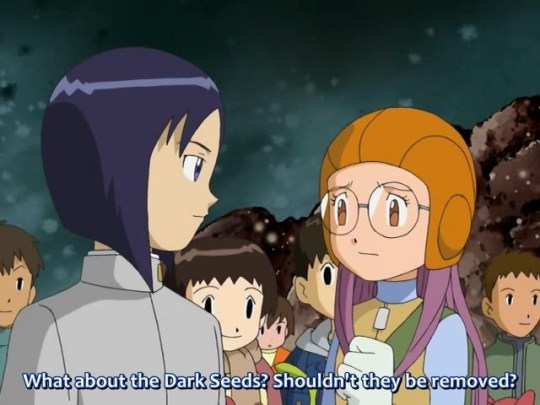
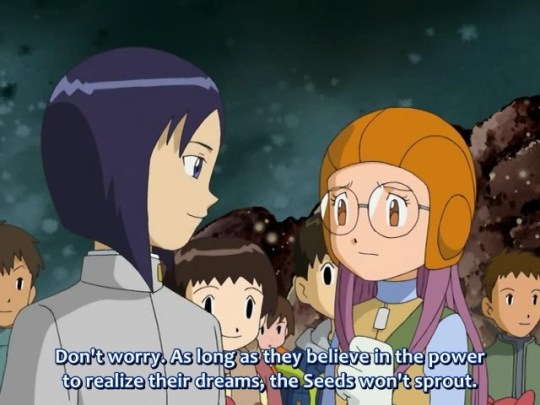
Thanks to his interactions with the rest of the 02 crew (especially Daisuke), Ken was slowly putting his life back together, but he still had a long way to go. As late as episode 49, we learned he still had suicidal ideation tendencies in regards to his deeds as the Kaiser, and although the rest of the team did get through to him in the end, it was clear that there was still a huge path ahead of him as far as coming to terms with himself and bonding with the rest of the team went. This was especially because he ended the series with the Dark Seed still in the back of his neck -- supernatural forces may have assisted his initial downfall, but it was going to be entirely on him to make sure that he never went back there again for the rest of his life.
One thing that’s really important to put in perspective is the actual chronology this ordeal took place in. Although the Kaiser saga spanned a little under half of the yearlong series that 02 was, Christmas skewed the schedule a little bit, so a good chunk of the second half of the series actually took place in much more condensed time than the first. Taking into account the official statement that everything before Christmas roughly aligns with the time of the year the relevant episode aired, and given the exact dates in December that we know episodes 38-50 take place in, within the course of 02, Ken’s reformation from being the Kaiser and bonding with the group spanned around only four months. That is not a lot of time, especially compared to the roughly two-year period Ken went through the trauma of his brother’s loss and his transformation into the Kaiser, so in actuality, Ken made a huge amount of progress considering how little time he had to do so.
Before we continue, I should make clear that I generally count pretty much everything in the Toei-esque fashion of “everything is canon, don’t think about contradictions too hard” (which is generally their modus operandi with pretty much any franchise), so pretty much everything here is fair game. That said, obviously, contradictions and other outliers do exist, so occasionally I am going to have to omit stuff that really, really doesn’t track...so for the sake of this analysis, I’m skipping Armor Evolution to the Unknown for two reasons: one, because it takes massive liberties with characterization for the sake of crack (it’s pretty hard to believe Ken would be this degree of flippant about the Kaiser persona in a more serious situation), and two, because it was written before 02 finished airing (it was released between episodes 43 and 44) and doesn’t reflect a lot of series and characterization development that happened later in the series. (Armor Evolution to the Unknown was released during a time period when the drama CDs were really, really big on the crack -- the three Adventure mini dramas are the same -- and it wasn’t until later that actual “serious” ones would start coming out.)
Given that, our next canonical point we can work with is Diablomon Strikes Back, which takes place in March 2003.

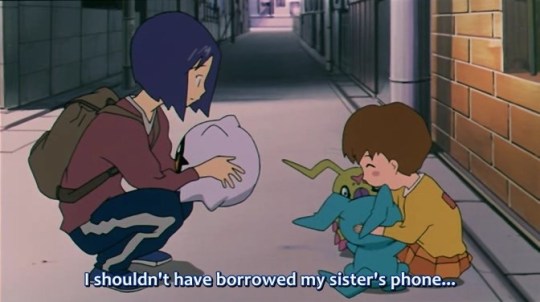
At this point Ken’s recovery is at a little around six months, and he’s making massive progress -- even if you’re not sure about counting the actual events of this movie as canon, it’s an excellent character study in terms of watching Ken’s emotional recovery at this point in time and his relationship with Daisuke, now that he’s not directly dealing with issues pertaining to his own past trauma.
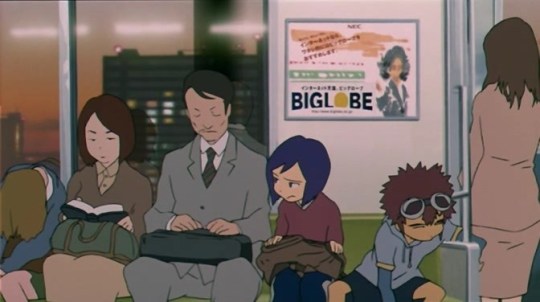
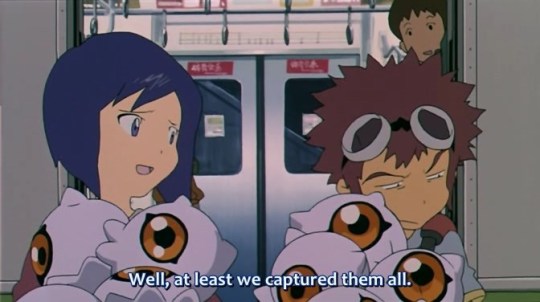
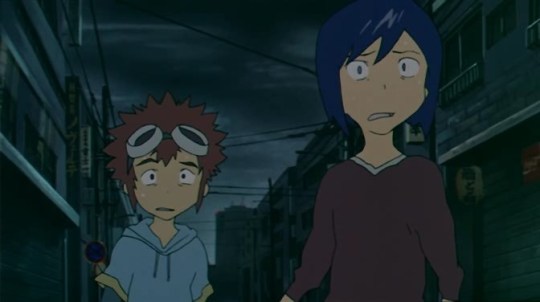
It’s already a very different Ken from the one we’ve seen in the original series, where in episode 38 the idea of him laughing was such a huge shock, but here we already see a much wider emotional range from Ken -- light cheerfulness, playfulness, and at times even a bit of petulance. His actions and dialogue still have Ken’s trademark “softness” -- being kind and gentle has always been said to be his core inner trait, after all -- but, nevertheless, he’s a lot more willing to show “superficial” emotions, especially compared to how closed up, shy, and sometimes standoffish he would be within 02 proper.
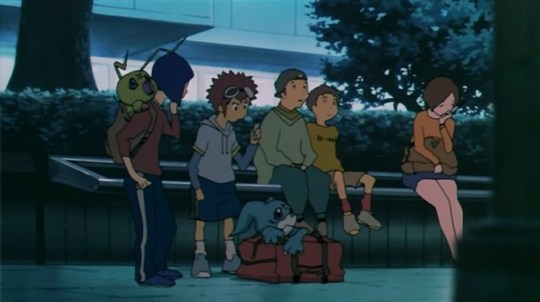
Even Ken’s own body language indicates a lot -- he’s much more relaxed and natural. Observe how he slouches here.
In fact, if you listen to Park Romi’s delivery of his lines throughout this movie, she voices him with a significantly higher-pitched and “lighter”, soft tone through all of it, which really gives off the impression that he’s much less emotionally uptight.
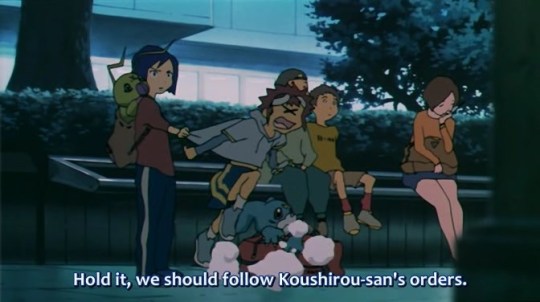
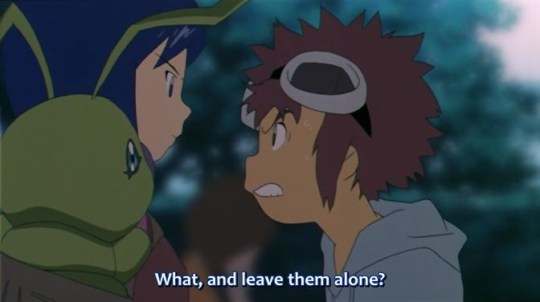
We get a glimpse of Daisuke and Ken’s future dynamic and how they’ll continue to be such tight friends in the future -- Ken is someone who can keep the infamously chaotic Daisuke in check (especially since prior to Ken coming into his life, Daisuke’s closest friend was probably Miyako, and while the two certainly got along very well with each other, they had a tendency to enable each other’s chaos a bit too much at times).
But despite Ken obviously trying to be more sensible than Daisuke here, it still manifests as a much greater show of emotion than the kind you’d be used to within 02 proper. He’s much more assertive with putting his foot down in keeping Daisuke under control, which indicates not only a more comfortable relationship with Daisuke in particular, but also a general increase in his ability to be assertive.
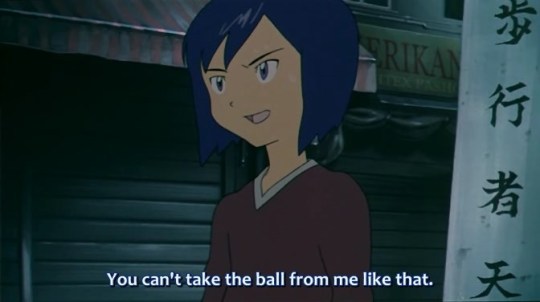
In one of his most famous scenes in this movie, he actually outright taunts Daisuke in order to spur him on. He’s doing it totally affectionately (it’s specifically to give Daisuke more motivation to keep running), but nevertheless, he’s taunting Daisuke -- not really something you'd expect from Ken in 02 proper. The original line in Japanese even has him use the very super-casual and aggressive end particle ~ze.
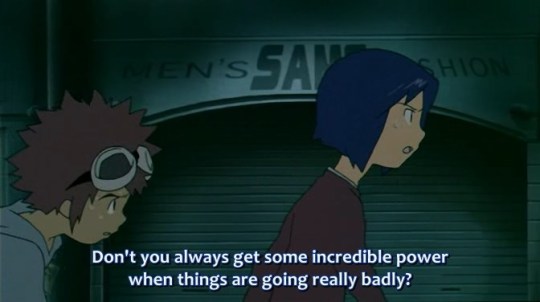
He even snarks about Daisuke’s convenient bouts of luck in ways that aren’t exactly complimentary (the literal phrasing of this line has “baka mitai ni” in it, in this context "some kind of ridiculous incredible power”).
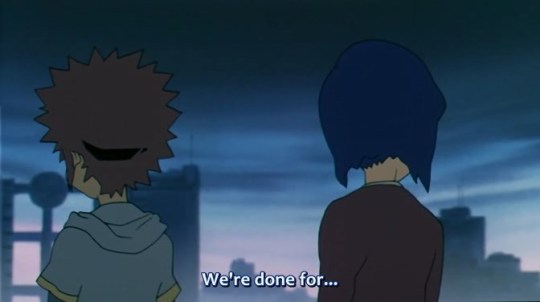
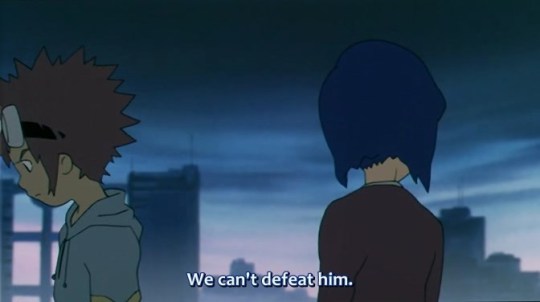
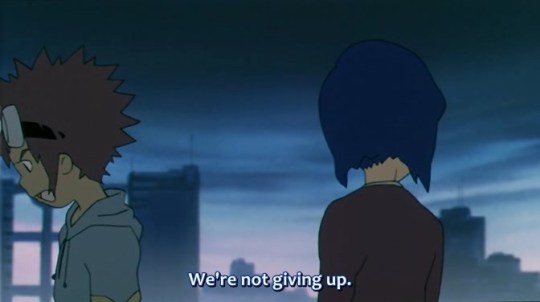
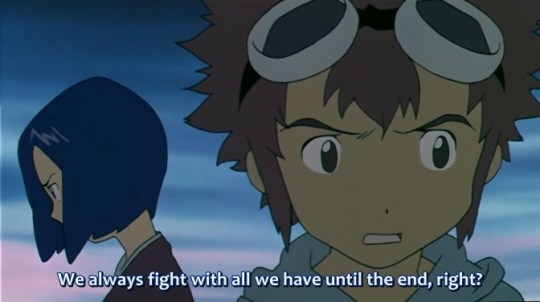
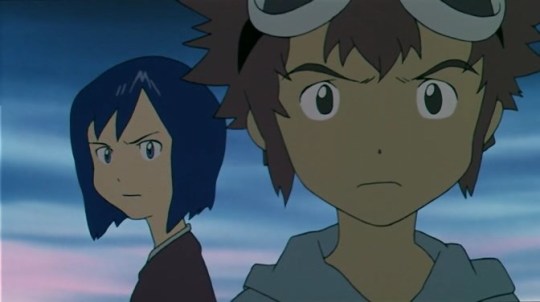
And, near the end of the movie, when he starts to lose hope, it only takes a single line from Daisuke to get himself back together -- this kind of thing would have probably taken a whole speech in 02, even from Daisuke himself, but by this point Ken’s got a much better emotional grasp on himself.
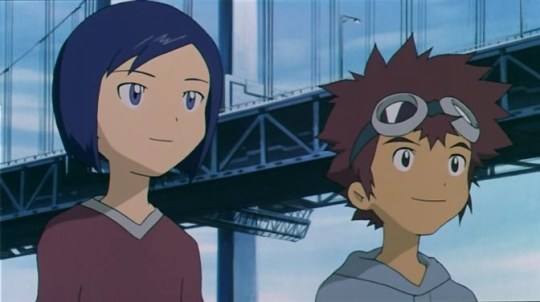
And in the end, the movie ends on both Daisuke and Ken laughing together -- very lightly.
It’s easy to pass off Ken’s characterization in DSB as an incidental thing simply because this is a “side story” movie from 02 -- especially since it was technically produced during 02′s airing -- but in fact, this portrayal is consistent with what Ken has to say about himself during his next known point in canon, Spring 2003.
Given that Takeru’s track is apparently set “three months” after Christmas, and Miyako’s track talks about having just entered middle school, I assume that this means Ken’s takes place in around late March or early April 2003 (almost exactly a year since 02′s start), but in actuality nothing really “happens” during Ken’s track. Nevertheless, it provides a lot of information on Ken’s state of mind during this time and his own self-reflection on his past...and defines in very clear words what it is that Ken needs to move away from.
You were always in a bad mood and you were cold to me, but now that I think about it, maybe you really wanted to be nicer to other people. I don’t know what happened to you that made you act like you did, but now, I finally feel like I understand a bit.
You were demanded to grow up fast, weren’t you, Brother?
Because we were always being evaluated and compared by someone, we didn’t get a chance to have more freedom. We didn’t have any chances to run down an alley because we felt like it, or pull up weeds, or tumble around… meaningless things, things that didn’t bring any value to us at all.
Just like the cat napping on the roof… we weren’t able to fully enjoy any everlasting freedom.
02 -- especially its latter half -- dealt largely with the concept of parents imposing too many expectations on their children, acting “proud” of them but actually using them to inflate their own self-worth, and in the end effectively robbing their own children of their right to “be children”. While we don’t know a lot about Osamu based on limited information about him, Ken’s parents also lament that they might have robbed Osamu of the opportunity to be a “normal boy” in 02 episode 23.
Once Ken took the role of the “family genius” after Osamu’s death, Ken was thus likewise robbed of that “normal childhood” due to all of the expectations put on him -- and Ken’s words in his track imply that it extended to before Osamu’s death, because just because Osamu was the favored one at the time didn’t mean that Ken wasn’t subject to the same kind of expectations to at least some degree, even if not as much. (Note how he really didn’t seem to have any kind of friends at all prior to Daisuke and the others.)
Thus, Ken’s ideal trajectory is to become “a normal child” -- one not subject to expectations as a “well-behaved genius child”. That applies not only to things like his academic or sports performance, but also even his core manners -- being a “normal person” in this context meaning being allowed to show emotions, be petty, have emotional range that extends beyond just being deferential and polite, and generally do things because he enjoys them and not because others expect him to. This is consistent with his portrayal in DSB, as in said movie he really does come off as a “normal boy” -- a young child who, while certainly less chaotic than Daisuke, is still enjoying himself and interacting with the world in “his own” natural, relaxed way rather than holding himself to obligations.
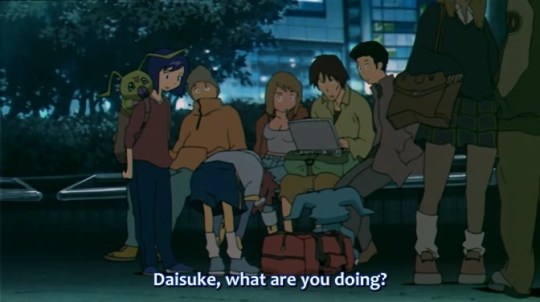
Another interesting thing about DSB is that it has Ken refer to Daisuke by given name. This is particularly intriguing because up until the end of 02, Ken consistently referred to Daisuke as “Motomiya” (he did use given name in episode 39, but it wasn’t something he really followed up on). This despite the fact he went with given names (plus honorifics) for everyone else in the 02 team, but it seems like Ken was still trying to figure out his very complicated feelings about Daisuke as someone who was his Most Hated Person™ during his Kaiser days and yet is now trying to aggressively reach through his barriers that he’s constructed out of self-defense.
And yet, extremely notably, almost every single post-02 material is consistent about the idea that Ken switches to given name basis with Daisuke after 02. (The only exception is Armor Evolution to the Unknown, which, as stated before, was written and recorded during 02′s airing and not after; notably, Daisuke is also on surname basis with Ken during that drama CD, even though he permanently switches to given name basis after episode 39.) That includes “out-of-hard-canon” things like Xros Wars episode 78.
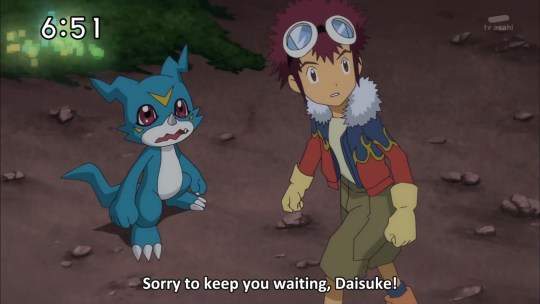
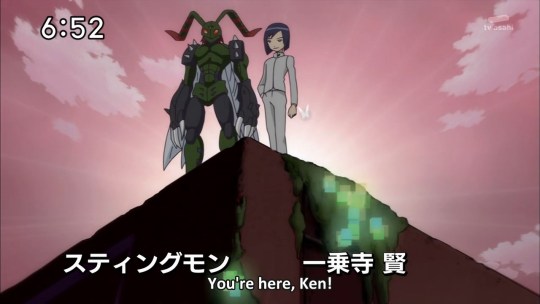
Yet they still couldn’t remember to put the highlight back in Ken’s eyes, among other things.
Honorific and surname-given name basis fluctuated quite a bit in both Adventure and 02 (especially whenever canon material changed hands between writers), but for all intents and purposes, there is no reason Daisuke and Ken should not be on mutual given name basis after 02. This is especially when you take into account the more naturalistic relationship they have as of DSB -- there’s no standoffishness at all between them anymore.
This ties very deeply into how 02 portrayed its characters. One thing I’ve very, very often pointed out was that it was always an explicit point of contrast between themselves and the original Adventure team was that the 02 kids were not only “friends” in terms of fighting together on Digimon cases, but “friends” in the sense of actual social-life friends who clicked well in personality and adored each other’s company. (Part of this was because of the core theme of the series; Jogress being such a huge motif, “understanding your friends” took precedence over Adventure’s “understanding yourself”.) These are the kids who hung out together in the totally-not-related-to-any-Digimon-incident (at least, not at first) picnic in episode 6 and Christmas party in episode 38, a stark comparison to the Adventure kids who infamously started drifting as early as Our War Game!.
(Note that this isn’t meant to diminish or drop shade on the Adventure kids’ bonds in any way -- I feel like their bond is more of one that’s a “transcendent” one that crosses space and links them through their shared experience, but, nevertheless, is simply not the same in nature as the “social life” bonds the 02 kids had where they were very casual and yet intimate with each other in almost all daily life respects.)
As a result, Daisuke and Ken’s relationship ended up very different from that of their predecessors Taichi and Yamato -- it’s actually hard to imagine them getting in all that many highly heated fights in the same way their seniors would be prone to, and they’d generally be on “mild banter” terms for most of it. In fact, they come off as pretty casual and in-sync with each other, and it’s to the point where it really does feel like -- especially by the point of DSB -- staying on “standoffish” surname basis really is unwarranted.
And while it’s tempting to limit Ken’s relationship to only Daisuke, this did involve the rest of the 02 group, after all -- we got significant episodes defining his relationship to the others (Miyako got a whole episode in 25, and 30′s entire events kicked off because of an attempt to get him to better socialize with Iori!), and the 02 kids as a cohesive “overall group” were integral in getting Ken to open up and show different sides of himself. Although his relationship to certain team members ended up closer than others (Daisuke and Miyako, the ones who tried most aggressively to reach out to him, ended up getting the most out of him), nevertheless, it was important that Ken ultimately cultivated a relationship with a group of friends, and not just one.
This, of course, brings us to Kizuna, which takes place in the summer of 2010. This is a massive leap of time we don’t know a lot about, and for all it’s worth, this means we have, compared to the approximately two years Ken spent suffering under the influence of the Dark Seed, a whole eight years dedicated to potential recovery. There’s a lot that could have happened during that time, and what happened in between, we can only really guess.

Well, for one, he cut his hair.
The reveal of Ken’s design for Kizuna was a huge shock for those watching, because, among all of the twelve main human characters in Kizuna, he probably has the biggest and most drastic design change -- especially because his long hair was so iconic that even the epilogue depicted him with it (and even longer, at that). Were it not for other important identifiers like Wormmon’s presence and the fact said hair is at least still indigo blue, you’d almost wonder if it’s the same character.
(I do have to at least give props to this Animedia poster, though -- that soft and concerned expression is textbook Ken-chan, so it absolutely nails the vibe that it’s the same character despite the massive design change, and it even has a small cute detail that, despite clearly trying to calm Yamato down in haste, he’s still tidy enough to lay his chopsticks neatly on the bowl. That Ken has a habit of doing this while eating hot ramen is a very specific minor blink-and-you’ll-miss-it detail in 02 episode 36, and while I’d normally pass this off as coincidence, Kizuna and its PR has had such ridiculous attention to detail that I’m not entirely willing to.)
Not only that, his actual outfit in the movie is rather unassuming -- it’s just a black shirt, pants, and a belt, compared to the more distinctive/fashionable or setting-immersive outfits everyone else has. I mean, it sure beats that godawful grey gakuran he was constantly wearing during 02, but there were certainly a lot of complaints about how...well, unassuming and plain he looks.
The thing is, though, this is very much in line with how Ken would most likely want to present himself. When you think about it, Ken himself would probably not really appreciate his fanbase status as the “sad pretty boy”; having been scrutinized, evaluated, and put on uncomfortable pedestals through all of his early life, “blending in” and coming off as an average, unassuming person would be right up his alley.
Anyway, before we get into Kizuna itself, we have the drama CD that came with its BD, Where Should We Go? While it was released after the movie, in chronological timeline, it serves as a slight prequel, and what we learn about Ken in it is certainly...interesting. Namely, that he’s apparently a hardcore fan of Japanese hot springs. And not just a hardcore fan of them, but also a complete nerd.
The hot springs *obviously* must have free-flowing water. If possible, I think I’d prefer a quiet, rural flowing hot spring that’s surrounded by a moss-covered garden. Then I want to stay the night at a historical inn that focuses more on tranquility and wabi-sabi rather than wildness or beauty. I’m not looking for a lot on the food options, but the portions should ideally be neither too large nor too small. If we’re just going to relax our bodies, then I’d like it if there was a variety of hot springs to choose from. The water quality that I recommend for the ladies would be the hydrogen carbonate spring or the alkaline simple hot spring (these are otherwise known as simple hot springs with a basic pH of 8.5 or above), but my personal favorite is the hot sulphur spring! Incidentally, the hot sulphur spring is said to treat arteriosclerosis and high blood pressure. If it were possible, I’d like to take my time there… At least stay for two nights! Ahh… Hot springs… Hehehe…
I cannot stress enough how much the audio delivery for this depicts him as being terrifyingly into it. It’s also...not exactly the most fashionable thing for a nineteen-year-old to be into (actually, it’s more of a stereotype old man thing, what with the fixation on traditional Japanese aesthetics and health nut aspects), but we have Ken being very shameless and assertive about his personal interests, even if they’re a bit unusual.
Funnily enough, this isn’t actually the first time he was demonstrated to be a huge infodumping nerd -- it’s just that the last instance was questionably canonical, but tracks extremely heavily with what was just demonstrated here. Namely, Daisuke and Ken’s Shopping Carol:
Listen, the thing about Christmas is that it's one of the most important days in the world...
It was the day the Savior was born...
So, you go to church and pray...
Of course, you knew all of that right?
Or in other words, he interrupts Daisuke’s wistful thoughts with The Actual Nerd Facts, because he’s a nerd. He even has a bit of a smart-aleck atmosphere...and then he cheerfully and sassily dumps all of the work on Daisuke thereafter. While the canonicity for this song is hard to place since it was released during 02′s airing (and 02 itself depicted a very different Christmas), plus the ambiguity of character song canon in general, it’s interesting how Ken’s portrayal here is pretty surprisingly in line with what we’re learning about his future personality.
The rest of what we see of Ken in the drama CD is what we generally knew about him already -- he’s kind, he dotes on Wormmon (he even indulges Wormmon’s request to take him skiing!), and he still keeps up with being into intellectual studies, and even soccer (he’s described as actually keeping up with soccer to the extent he does training camp), because he was always interested in those kinds of things -- it’s just that now he can indulge in them in ways he personally likes instead of being held to other people’s standards.
But he’s also very emotional, passionate, and openly assertive -- something he could be in 02, but only when it was something he really, really cared about, because most of the time he was a little more on the shy side with others. Not anymore. And he’s happy to indulge in the chaotic trip planning and enable the others, and, at the end, gives some sentimental words to Daisuke, his best friend.
Anyway, onto the movie itself!
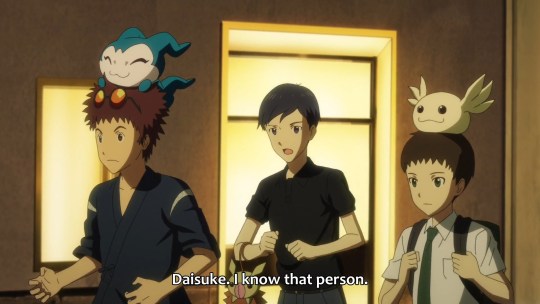
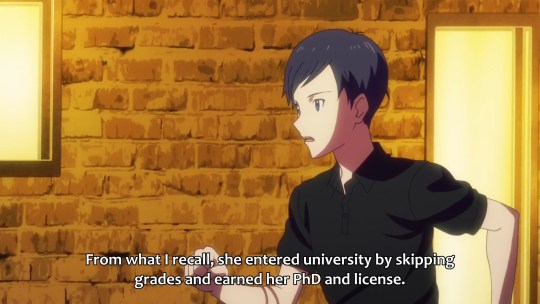
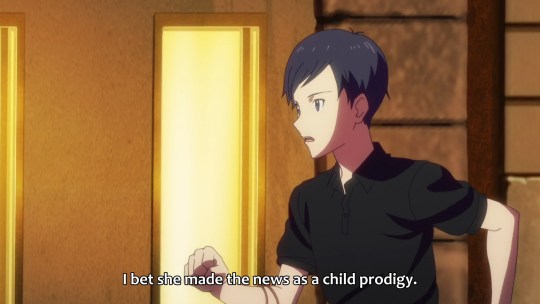
Notably, they do not mention Ken’s past trauma nor his deeds as the Kaiser throughout the entire movie.
That might surprise people, given that this was...well, central to the entire plot of 02, so it’s arguably a glaring omission that despite having the 02 cast here, it’s not even brought up once. The only real “reference” to it is this scene, where Ken happens to be the one who knows about Menoa’s background as a child prodigy -- and even then it’s uncertain whether this had anything to do with said traumatic events (Menoa was admitted to Liberica in 2002 itself) as much as it’s a meta nod to Ken having a suspiciously similar background and the fact he and Menoa were based on the same real-life story (the nine-year-old boy who skipped grades into Columbia University).
But, again, recall that Ken has had eight years to move on from the events of 02, more time than said events had actually spanned over. That doesn’t mean he’s easily going to forget that trauma, nor that said events don’t still have an impact on him, but rather that a true positive development for him should have him not having to consciously dwell on it if it’s not necessary, and that his friends of now eight years should probably not be still holding it over him at a time like this.
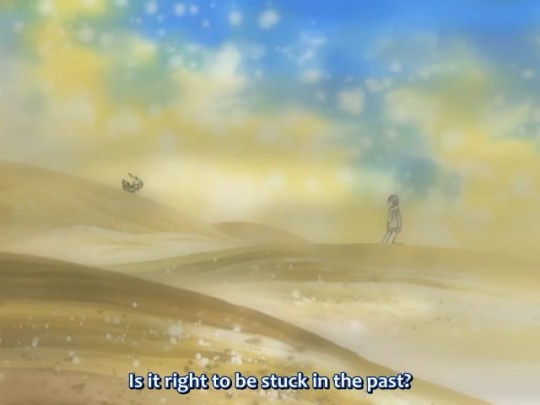
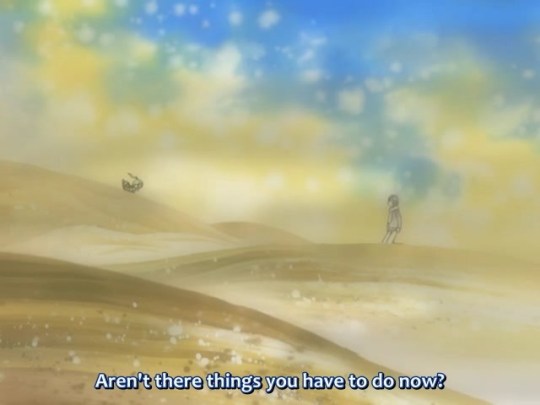
After all, 02 itself was dedicated to scolding this kind of behavior -- not being “stuck in the past” (which, well, also happens to be a very pertinent theme when it comes to Kizuna...) was basically the entire point of the latter half, and so it stands to reason that Ken, and by extension the rest of the 02 cast, would be more focused on what they’re doing now instead of what happened back then.
In the absence of any references to said past, Ken in the actual movie ends up coming off as a bit unremarkable and plain compared to the three friends who end up surrounding him, all of whom have much more extreme personalities (the chaotic and exuberant Daisuke and Miyako, and the comically poker-faced Iori). But you get the feeling that he’s perfectly fine being that way -- rather, he’s enjoying getting all of his fun from his exciting friends, without feeling a need to spice things up himself.

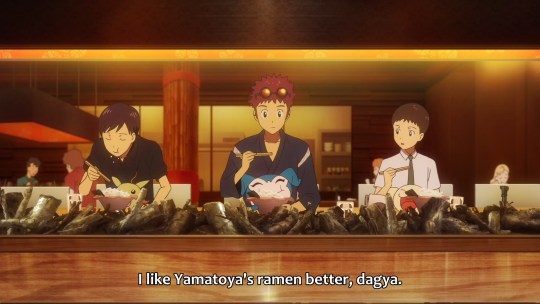
So when we finally do meet Ken for the first time in Kizuna, he’s cheerfully eating ramen with Daisuke and Iori in New York (which, for all it’s worth, is probably really questionably legal, considering that Adventure’s world of 2010 likely still hasn’t figured out how to deal with that whole thing with “immigration and customs” as it pertains to Digital Gates.) Emphasis on cheerfully. He’s as tidy as ever (note how he still properly keeps his chopsticks between his fingers and cleans up after himself, albeit not as well as Iori), and he’s obviously more straight-laced than Daisuke or Miyako, but he isn’t really hiding the fact he’s also totally enjoying this. He didn’t even know why they were there for ramen in New York in the first place, but he just rolled with wherever Daisuke took him.
Recall that, according to their official profiles, these three go to completely different schools now -- Iori’s in high school, Daisuke’s at vocational school getting a chef’s license, and Ken’s in university studying psychology. (Which, by the way, is not brought up at all throughout the movie nor the drama CD! It’s easy to glean how his past experiences might give him an interest in the topic, and it’ll certainly be a valuable background to have for his future known career in criminal investigation, but despite Ken previously having had a reputation for being studious, it’s not brought up at all -- almost as if hanging out with his friends and having fun with them is more important and pertinent.) The drama CD even points out that Ken would normally be busy with soccer training camp. Yet they’re hanging out. In New York. Eating ramen. So, Yamato, what were you saying about how “choosing your own path can sometimes mean being alienated from friends”? If anything, these friends seem to be going out of their way to make sure they’re staying tight.
And, as you’d expect, Ken refers to Daisuke by given name, following DSB’s precedent. Again, given the nature of their relationship right now, this should be expected. There’s other evidence that Kizuna does use DSB as reference in certain other respects as well (Takeru calls Yamato “niisan”, which had previously been exclusive to that movie), and it’s very possible that Ken as portrayed in that movie was used as reference for his potential trajectory here.
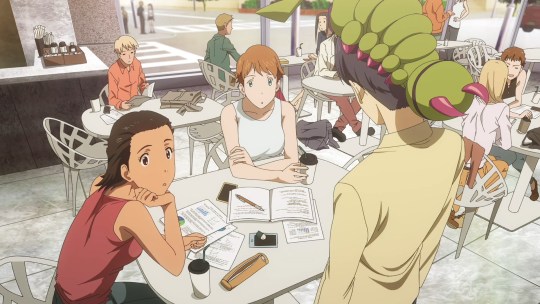
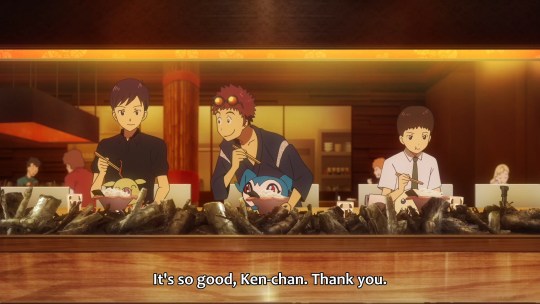
Note that he seems to be even more outwardly affectionate with Wormmon than before (which is, shockingly, apparently possible) -- he still feeds his partner before feeding himself (similar to what he did in 02 episode 37), but now he also shamelessly carries Wormmon on his head, which he never did in 02. Perhaps it’s because he’s tall enough to carry the weight, but unlike with Takeru and Patamon, Wormmon is big enough that the sight is honestly comical -- yet Ken couldn’t care less, and while we don’t see him in his own school, it’s a sharp contrast to how Taichi and Yamato scoffed at the idea of bringing their partners to school because they “have their own lives to live”.
(A nice touch is Ken carrying Minomon from his arm, which actually comes from a very obscure piece of 02 concept art -- you can find it in the Character Complete File or the Animation Chronicle -- but was never depicted in the series proper. The Kizuna design works in the April 2020 edition of Animedia actually recreated that piece of art with Ken in the exact same position, only as a nineteen-year-old this time, which was an incredibly welcome thing to see.)
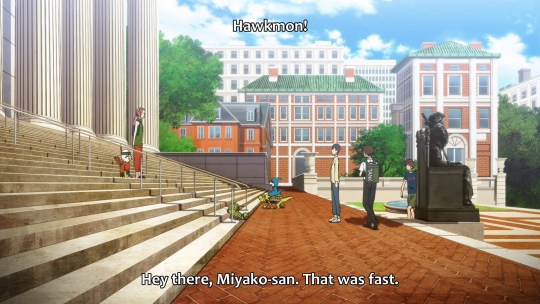
He greets Miyako upfront when she arrives, which doesn’t look like much on its face, but recall that this probably wouldn’t have happened during 02 proper -- not even with Daisuke! -- and, at the very least, not with this very casual “hey!” tone. It means a lot in terms of how much more casual of a person he’s been able to become in the last eight years, and how much more casual he is with this group (well, at least with Miyako). Takeru also greets Wormmon in the drama CD, and Wormmon seems pretty unusually happy to see Hawkmon when they meet each other there, certainly implying a lot of interpersonal interaction since.
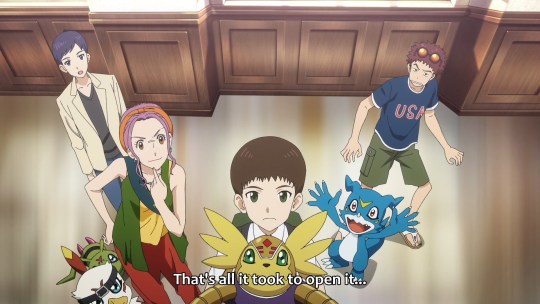
Miyako meets up with them (and, going back to how tight these kids are, Miyako would come in all the way from Spain to meet her friends even for the exact same job that she dumped on her seniors), and they end up infiltrating Menoa’s office. He gets in a line of snark, especially because the Shueisha Mirai novel indicates he’s deliberately “looking the other way” in regards to worrying about security -- looks like he’s developing some Lawful tendencies, but in the end, his friends and getting to the bottom of the real truth take priority.
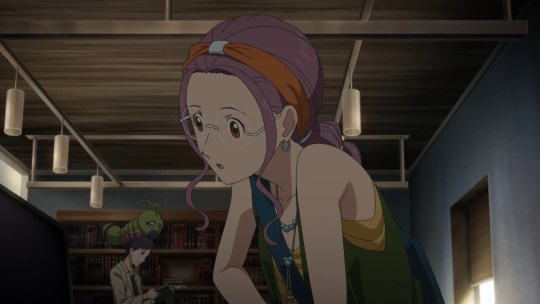
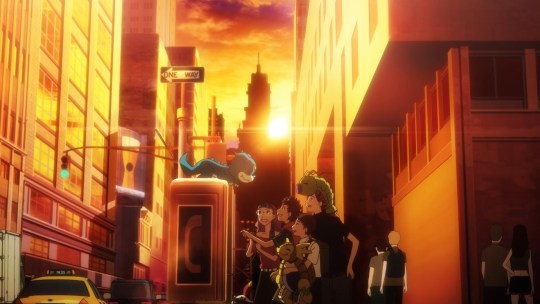
And, also, it’s still pretty clear he’s totally taking the opportunity to enjoy this.
So what does this all mean, really? He’s taking a fairly passive attitude with his abundantly more chaotic friends, but he’s also not protesting, and he’s enjoying everything he can out of it. He’s a bit quieter than he was in DSB, but that could easily just be from being older and a bit more mature, and he hardly comes off as reserved, either (it helps that Daisuke doesn’t quite resort to any antics nearly as ridiculous as he did in DSB, so there’s no need to keep him in check -- yep, even Daisuke got a bit more mature himself). And he’s joining these kids in being possibly some of the most chaotic disaster adults (near-adults?) on this planet, in a sharp contrast to their seniors.
I mentioned earlier in my analysis of Kizuna’s relationship to 02 that Ken is actually a “hidden” foil to Kizuna’s main antagonist, Menoa -- they were both conceived from the same idea Producer Seki had regarding the real-life “genius boy” who ended up going to Columbia University at a young age and, in her opinion, was going to be robbed of a proper childhood experience. 02′s Dark Seed children arc was a major indictment against parents forcing this kind of pressure on children, not only in the sense of pushing them academically but also quashing out their more “childish” dreams for the sake of a more “dignified” outlook and future. Through the events of 02, Ken learned a very personal lesson on not losing his “true self” to the pressure of those expectations, and the meaning of valuing his family and friends instead.
Ken and Menoa, effectively, were originally on the same path, but thanks to the circumstances of 02, Ken managed to avert Menoa’s fate and ended up following his own way. Nevertheless, Ken was largely robbed of a normal kid’s childhood up until the age of eleven, and it stands to reason that, even at the age of nineteen, he might still be trying to make up for all of those fun experiences he never was able to have.
Funny thing about his haircut, too -- this isn’t the first time Ken’s had this haircut, actually. You know when was the last known time he did?
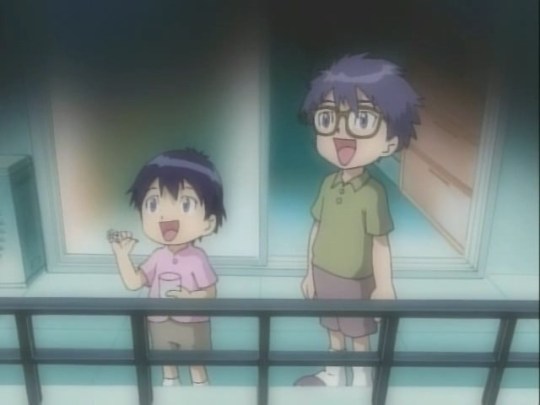
Hm. Coincidence? Maybe. Maybe not.
But unlike Menoa, who decided that it would be better to trap herself in her own distorted view of what “childhood” is, or Oikawa, who ended up clinging dearly to the last reminder he had of what he’d lost from his childhood, Ken ends up dealing with it in a very forward-facing manner. In fact, he’d elucidated his feelings on the issue back in Spring 2003:
There are still a lot of times when I think about how I should have “done this back then.” But I discovered that there are many things I can do over afterwards.
I’ll stop counting the things that I can’t do. Because I’m sure there are many things that I can do.
Instead of living in regrets about the past, Ken simply chooses to move forward by making new fun experiences and memories with his friends, befitting those he couldn’t have when he was a kid, and perhaps even enhanced by his newfound freedom as a nineteen-year-old.
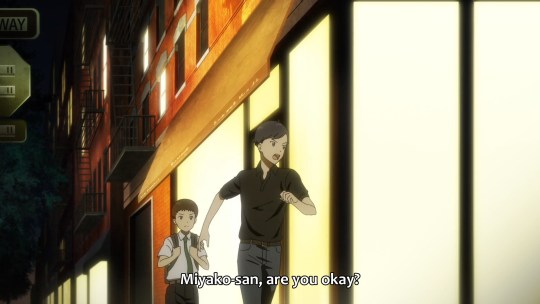
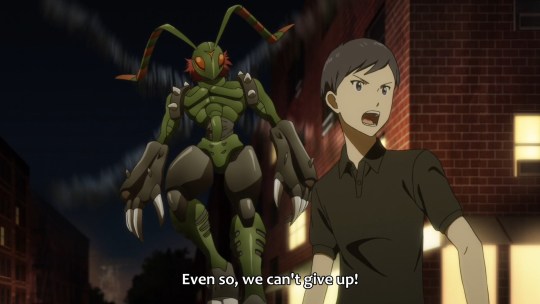
During the final battle, we get a few more emotional and assertive shows from Ken -- his concern about Miyako is pretty frantic-sounding, and the fact he steps in so quickly and frantically to help her out by his own will is pretty impressive. And then he definitively declares that they can’t afford to give up -- which is certainly in line with the nobility he had even during 02, but remember when, even in DSB, Daisuke had to be the one to remind him of this? Now he’s the one reassuring his teammates about this, all on his own. When it all comes down to it, his sense of awareness of what he wants and what he wants to do is stronger than ever.
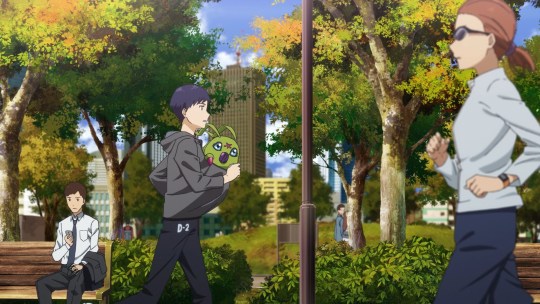

I mentioned in my analysis of Kizuna in relation to 02 that the 02 kids are in a fairly unique position in the movie, thanks to having already practically gone through a lot of the lessons in both 02 and Kizuna, thus leading them to become very lacking in susceptibility to potentially losing their partners anytime soon (and in fact are deliberately portrayed as such). I would say of all of them, Ken is the most representative of this -- being such a direct foil to the movie’s main antagonist, one who actually came dangerously close to making some of the exact same mistakes she did and emerged with his own trauma as a result, the lessons and warnings imparted by the movie are already deeply embedded in his being.
He’s one of the most openly affectionate and intimate with his partner, having already learned the very, very hard way of what happens when you don’t treasure your partner properly. (He’s taking Wormmon jogging with him, which has got to be an awfully uncomfortable setup, but, goddammit, he’s gonna make it work. And if ~With~ is to be believed, he’s been doing this for years now.) He’s still got a Dark Seed in the back of his neck as an eternal reminder to remember who he is, and to acknowledge the love from his family and friends around him instead of succumbing to arbitrary societal expectations. Remember what I said in my earlier analysis about the true reason for partnerships dissolving, and how deeply it was tied to throwing yourself away for the sake of arbitrary standards of adulthood? Ken’s experiences and extremely painful trauma are like a giant do not do this stamp on his face, and although everyone in this cast is naturally human and may have ups and downs or relapses, Ken is possibly one of the last characters one could imagine succumbing to that kind of mistake again.
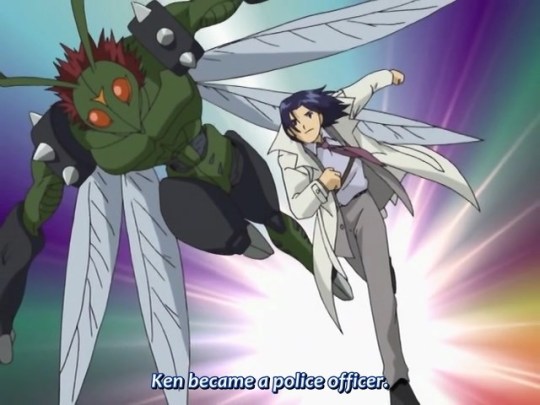
So we make it to the epilogue, and although Ken’s technical job title as given in the epilogue is literally “police officer” (keisatsukan), his form of dress (plainclothes, not uniform) and his the Character Complete File indicate he’s from the Digimon Special Investigations Unit (tokusoubu), or, in other words, he’s actually a public-servant detective. (So no, the various dubs also going with “detective” are thus not “changes” in this respect.) In short, he investigates scenes of crimes after they happen, and the Character Complete File provides an example in the form of him investigating a dead body found at the river.
This is probably why Kizuna has him major in psychology, because forensic psychology would be a pretty useful skillset for this kind of job, and a university education in general would most certainly be helpful. (The job requirements as per the Japanese system also require a very high level of athleticism and aptitude.) On the other hand, considering what we know about Ken up to Kizuna, there aren’t any indications that he treated this like any kind of major aspiration, and the psychology major makes you think he might have just fallen into this career by a series of accidents -- he took an interest in psychology (and mental health) due to his own experiences, and then decided that “discovering the truth behind things” was up his alley (much like Iori). Even more notably, his position isn’t really described in any history-making terms, not even ones like being “the first” of anything (like Jou), and it feels like he’s doing this to contribute to society in a way he prefers more than he’s trying to accomplish anything world-shattering.
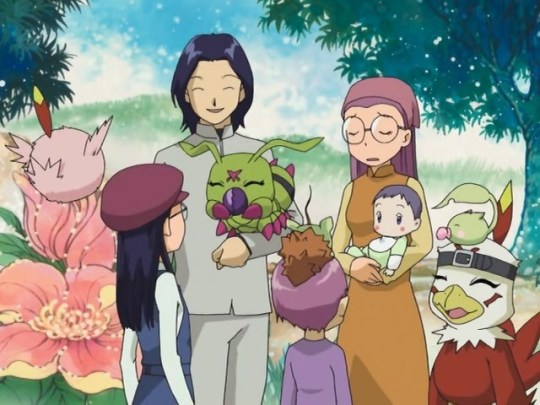
But on the flip side, it’s probably no coincidence that the 02 epilogue portrays him with such a big family. Of course, it also fits with his and Miyako’s family backgrounds (they’d probably want their kids to have siblings, given their own experiences), but since the Dark Seed was described as having its effects countered by acknowledging how much you’re loved, Ken is clearly surrounded by love -- his wife is one of the most openly affectionate people out there, and his kids (or at least his middle child) use the same “Mama” kind of affectionate language Ken shared with his own parents. Once the events of 02 came to a close at the end of 2002, Ken went on a journey of discovering his own self-assertion, personal desires, and fun -- shedding the expectations and societal standards others had of him, and learning to enjoy life in ways he personally enjoys, for his own sake.
#digimon#digimon adventure 02#digimon adventure last evolution kizuna#ken ichijouji#ichijouji ken#shihameta#kizuna spoilers
123 notes
·
View notes
Note
now if its possible, shinji for the ask thing?
FAVORITE THING ABOUT THEM: He wears a beanie on his official outfit and for around 4 years of my life, I also always wore a beanie on my head at all times cuz I couldnt control my hair. So ya know, relatable.
Seriously, though: He’s probably the best Persona 3 character, who carries a whole lot of the theme on his personal arc, like the fact you’re gonna die and how you live your life, matters. Also ,the way he is a victim of circumstances, but doesnt ever complain about that, and just accepted his terrible destiny… in a way, there’s a lot of dignity on how he carries himself, you know?
LEAST FAVORITE THING ABOUT THEM: If you want to. Like, if you really want to, or just doesnt think much about it, you could easily define his character by “tsundere” traits. I obviously hate this characterization and want nothing to do with it, but judging by how some people characterize him and Aki, you would not be guilty of thinking like that. Weirdly enough, in PQ thats pretty much his thing.
FAVORITE LINE: He has some of the best and most significant ones. “Live” for Ken, but “ “Adios, asshole.”and “Still alive? … Good” when he comes to help.
BROTP: Shinjiro and Hamuko is Good Stuff, good quality content. Shinjiro and Fuuka is also flawless. Shinjiro and Junpei learning how to deal with each other has a lot of potential. Shinjiro and Yukari/Mitsuru growing to care about each other, same.
But Mitsuru and Shinjiro is, ultimately, the real thing. Shoulda’ve been canon brotp if you ask me.
OTP: Shinijro/Akihiko was the Air I breathed for around 3 years of my life.
notp: Shinji/Hamu mostly because… of the fandom’s characterization of it, rather than for the actual ship.. Shinji/Fuuka cuz is mostly a bro thing to me.
random headcanon: His dad left him and thats why he end up on the orphanage. This left him with a lot of issues around his self-worth. He used to pick fights against other kids and didnt want to make friends with anyone cuz he was convinced his dad would come back to pick him up.
He took in a bunch of part time jobs while living on the street, so he knows a buch of restaurants around town, and other places that could accept him to at least wipe the floor.
unpopular opinion: I have come across with two characterizations of Shinjiro that usually go like “UwU Shinjiro secret baby, likes cooking and fluffy things” and “Shinjiro is an asshole who cant put two sentences together without cursing” and I’m pretty sure both of those are an exaggeration.The real guy lies in the middle. I especially dont agree with the first one, though.
According to his dialogue during battles, he’s pretty much on his natural, by fighting out Shadows, cursing them out and is generally rude, too. Dude, he fights shadows with an Axe, with traffic signs! Some of his first lines on his social link are laughing of a wound he has on his mouth that he forgot he had, and it was due to Aki punching him, which he takes lightly. He hangs out on that suspicious corner of the town on which all the other delinquents seem afraid of him.He literally fights them all without difficulty, on the movie.You dont get to be a person like that, without being comfortable with the idea of wrecking the next idiot that crosses your way or talks about crossing your way, and to become that, you need a lifetime of fighting others, and being good at it. You also need to be smart and knowing your way around town, like bars, clubs and underground meeting places. It struck to me how Shinjiro refers to the owner of the Club Escapade as his friend. That implies knowing the towns underground and nasty places and not only knowing of it, but knowing about it intimately. Thats pretty much where he lives.
That being said, none of this cancels out the fact Shinjiro likes cooking, seems to be an nurturer of others by nature, and gets along well with animals. It kinda goes with it, actually. He seems to be a mysanthrope so he likes animals best, has no wish to grow closer to others cuz he already accepted his death, so of course he’s not out there cooking for everybody he meets, and being affectionate and cordial. Its not as much about him being shy, despite the fact he`s awkward, its about him having no wish to get out of his way to connectwith others, since his one everlasting connection is alreay giving him such a pain in the ass, anyway. I’m not saying that Shinjiro enjoys being a tough looking guy with a bad reputation, but its not just some kind of appearance he’s trying to keep up as if it was a farce, it does seems part of his personality.
People who try to cancel out Shinjiro’s tough-semi-aggressive tendencies and behavior because of his more soft side, rub me out the wrong way cuz like… you do know people can be well rounded on their interests and facets, right? You do know tough guys are capable of tenderness, in fact, most people are, right? Like,one thing doesnt cancel the other and we dont really know who Shinjiro would be if he wasnt on his “guess I’ll die” state of mind, anyway so, a characterization that tries to make him soft and uwu and tsundere rubs me the wrong way, since you’re deliberately trying not to think on a heavy part of his characterization so you can have a softer shinji, which makes him kind of an archetype of a character, easy to describe on two sentences, just like Mitsuru, Aigis and Akihiko. Both, the fandom and also PQII seem to sin on this.I also believe that on the Persona 3 original game, he wasnt supposed to be interpreted as your typical good looking guy, - taking a look at his first sketches; because of that, I try not to think of Shinjiro as your generally attractive dude. Of course, Shinjiro has a way cleaner design on P3DMN, which I dont mind, so its not something I would fight for, or anything.
song i associate with them: Los campesinos Avocado Baby:“I had a friend who / had made a flag day /blood on their hands from / shards of a heartbreak I have known friends who crack from love’s weight blossom in ribcage, until their backs break Oh it won’t get better, that doesn’t mean it’s gonna get any worse. You’re final draft'a life-long love letter, signed to the man who will be driving your hearse.” favorite picture of them: I dont even know, but a good 90% of the Shinjiaki pictures I’ve seen probably made my heart beat faster, when I was really into them as my p3 ship.Can I toot my own horn and say this one? Its mine, from here.
#shinjiro aragaki#persona 3 talk#akishinji#shinjiaki#aragaki shinijro#long post#text post#long text post
36 notes
·
View notes
Text
Inside the Amazon company that's even bigger than Amazon.com
yahoo
Everybody knows what “the cloud” is, right? It’s, like, internet storage or something? Sure. Yeah.
I wanted to go a little deeper. I wanted to know exactly what it is, where it is, who owns it, who runs it, and how it works. So I did a little travel, conducted some interviews—and last Sunday, “CBS Sunday Morning” aired my story. You can watch it here.
The “who runs it” part has a particularly interesting answer. In large part, the answer to that is, “Amazon” (AMZN).
Over the last decade, Amazon has quietly built up the world’s largest cloud-services company, called AWS (Amazon Web Services). In terms of income and profit, it’s much bigger than Amazon.com (the division that sells stuff by mail-order).
It’s also much bigger than its rivals, which include Microsoft (MSFT), IBM (IBM), and Google (GOOG, GOOGL); in fact, AWS says that it’s bigger than its next 14 competitors combined.
Most companies don’t like to reveal what cloud-services company they use, but here are a few companies that don’t mind saying that they run on AWS: Hulu, Netflix, Comcast, Spotify, Pinterest, Yelp, Airbnb, Slack, PBS, SmugMug, Hertz, Time, Intuit, Unilever, Zillow, Dow Jones, Morningstar, Under Armour, Kellogg’s, Expedia, Adobe, Philips, GE, Shell, AOL, BMW, Canon, Capital One, IMDb, Johnson & Johnson, Lamborghini, Lyft, McDonald’s, NASA, Novartis, Pfizer, Philips, Samsung, SAP, Sony, SoundCloud, Ticketmaster, and the US Department of State.
For the TV story, I had the rare opportunity to interview an Amazon executive: Dr. Matt Wood. His current title is general manager for artificial intelligence AWS, but he’s been part of AWS from the beginning. (I asked him if the “Dr.” meant medical doctor or PhD doctor. In Wood’s case, both. He started his career as a medical doctor.)
As always happens, though, the time constraints of TV meant that not all of the good stuff from our interview made it into the broadcast. So here, for your reading pleasure, is a more complete edited transcript of my interview with Dr. Wood.
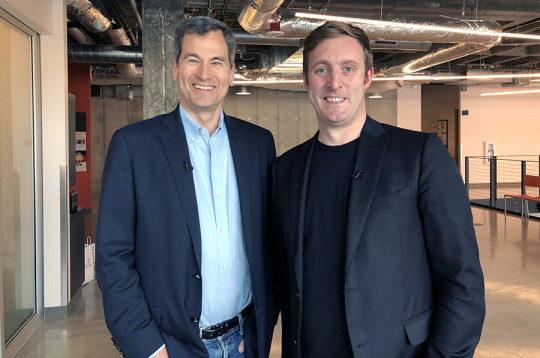
Dr. Matt Wood (right) joined me for a “CBS Sunday Morning” interview at Amazon’s Seattle headquarters.
POGUE: Because AWS caters to businesses, not ordinary consumers, most consumers haven’t heard of it. But it’s giant, right?
WOOD: It’s a relatively large business today. We’re a little over $16 billion in revenue run rate [projected income for 2017], and we’re growing at just over 40% a year.
POGUE: So who had the foresight, when AWS started, to say, “You know what could be really a good business for us…?”
WOOD: It actually came out of Amazon retail. The developers inside Amazon retail wanted to be able to move more quickly. They were frustrated about having to write big checks [to buy new server equipment] and wait and wait and wait [for them to be delivered], and do all this extra work to be able to try out their idea.
And so we started to come up with some ideas about how we could make that faster. And so we started to explore an entirely new business for us, selling these services to businesses in the same way as Amazon was consuming them.
POGUE: So all of these companies are hiring AWS to do what?
WOOD: They are able to pull down computational power as if it was a utility.
So let’s say you’re a brewery, right? They don’t want to manage computers. They want to brew beer. They don’t want to be going through the expense and the upfront cost and all the complexity of managing these large amounts of computers.
POGUE: So it sounds like cloud companies like AWS are basically renting computers, storage, power, security—all the stuff that technicians would have normally had to do on site, right?
WOOD: That’s right, yes.

AWS is relatively unknown to consumers—but it’s by far the largest piece of Amazon.
POGUE: Are you also saying there was a time before cloud companies when people did all this stuff in house?
WOOD: Yeah. People often talk about the “heavy lifting” of building web applications or mobile applications. Well, back when I was doing my Ph.D., we were given the task—a group of Ph.D. students—to move a mainframe computer from one room to another.
This thing weighed — it must have been several tons. It took about eight wimpy nerds to try to lift it. We dropped it, and it got stuck in the doorway. (LAUGH) We had to get the university football team to come in and help us move it out of the way before our professors came back and found us!
POGUE: (Laugh) Literal heavy lifting!
WOOD: So it’s not like that today. All I need is an AWS account and a credit card, and I can start trying out new ideas, for pennies.
And larger organizations find the same benefits. And so today, very large organizations such as, you know, GE, Shell, Phillips, Netflix, all run on top of AWS.
POGUE: Really? Netflix?
WOOD: Yes.
POGUE: Wait. Amazon has a very similar business—Amazon Prime Video. Why would Netflix hire its arch-rival to store and serve up its movies?
WOOD: Well, that’s a good question. It’s one that Netflix asked us very early on. (LAUGH) From the very first day of AWS, we set up the company as a separate business. We have a separate management chain; we are situated in a separate building.
We even wanted companies that could potentially compete with Amazon.com—our cousins at retail—to be able to use the same platform. And so to AWS, Amazon.com is just another customer.
POGUE: Is there a downside to the cloud idea? Is there any reason that somebody might shy away from structuring their data this way?
WOOD: The only reason I can really think of is that some companies have already made those very, very large investments in their own data centers. They’ve signed the checks, they’ve done the waiting, they’ve racked and stacked their service. And so they’ve already made that investment.
POGUE: So suppose I’m one of these companies who’s got an existing computer setup, and I want to move to AWS…
WOOD: Yeah. There’s a couple of ways that you can do that. You can just upload it as normal. But sometimes you have so much data [that it would take forever to transmit electronically]. So we built this device–the Snowball.
(He shows me a suitcase-size, gray, plastic-enclosed case.)
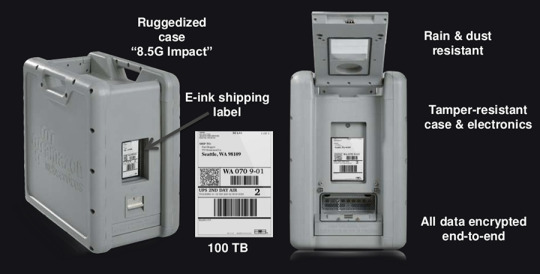
The AWS Snowball can be a faster, cheaper way to send a company’s data to Amazon than uploading it.
POGUE: Snowball, you call it?
WOOD: It’s 100 terabytes of storage. And you just connect this up to your data center, load your data on. And then you just physically ship it back to us, and then we load it into the cloud from our data center.
POGUE: Ship it, like through FedEx or UPS or something—
WOOD: Exactly. You should never underestimate the bandwidth of a FedEx truck. (LAUGH) In fact, right on the front here, you can see that we have an e-ink display—basically, a Kindle—which shows the customer’s address when we ship it out to them. And then as soon as they arrive and plug it in, [the address on that screen changes to show] our data center collection location, and you just ship it back to us.
POGUE: Oh, this—this is a screen, this is not paper—
WOOD: Exactly, yes. Because we didn’t want the shipping labels to come off in transit.
POGUE: So essentially, this is like a giant shippable hard drive. Can you track it?
WOOD: Yeah; it has 3G, Wifi, and also a GPS system.
POGUE: But hard drives are delicate. What if the shipper guy drops it?
WOOD: We built them to be robust and ruggedized. We actually built them to military specifications. We put them on a boat in the middle of a lake and then exploded depth charges around the boat and then made sure they could still work.
POGUE: Can it handle a drop to concrete?
WOOD: Easily, no worries.
POGUE: Like this? (I shoved the Snowball off the table onto the concrete floor, where it just bounced and then lay flat) It’s okay, folks! It doesn’t have a scratch on it. I don’t know about the floor, though.
WOOD: (LAUGHS)
How AWS handles security
POGUE: OK, we gotta talk about security. I imagine you have a huge staff of experts?
WOOD: Yeah. I mean, security really is job zero for us. We take it extremely seriously. It’s the first thing that we think about when we get up in the morning, it’s the last thing we think about when we go to bed.
POGUE: Because “the cloud” actually resides in data centers—huge, unmarked buildings running thousands of servers. And one AWS data center may house the livelihoods of a bunch of companies, all concentrated in one building.
WOOD: Actually, we don’t even store all of the data in one place. We don’t have a single data center. We use groups of data centers. And those groups of data centers are separated by large distances. They’re on separate floodplains and fault lines. We move data automatically between the data centers in those groups. And that means the data is always backed up, not just inside a data center or between data centers, but between groups of data centers in different physical locations.
POGUE: So I don’t mean to give anyone ideas, but let’s say I figured out that one of these unmarked buildings was an AWS data center, and I blew it up. Are you saying that it’s so backed up and redundant that you probably wouldn’t notice?
WOOD: Yeah, you wouldn’t notice. I mean, we might be a bit upset, but you wouldn’t notice.
POGUE: That leads into my other question, which is that 70% of the cloud, 70% of the world’s internet traffic, flows through data centers in Loudoun County, Virginia. Should we be worried about that concentration?
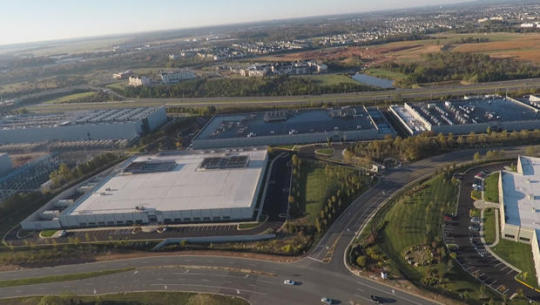
70 percent of the world’s Internet data flows through the massive data centers in Loudon County, Virginia. (CBS News)
WOOD: No, that data is backed up across multiple different physical locations. And we do that to limit the blast radius. If something does happen, or we have a power event, or there’s a flood in one specific location, that data is held redundantly in other locations, as well. So the cloud just keeps running.
POGUE: How is each physical AWS data center protected?
WOOD: The first thing is that we control personnel extremely tightly. So although I’ve been at Amazon nearly 10 years, I’ve never visited one of our data centers. I’ve never stepped foot inside them. I don’t even know their addresses.
POGUE: Because you’re not allowed to?
WOOD: Because I’m not allowed to, yeah. I don’t have any reason to be there. And a data center’s primary vector of insecurity is physical attacks. So you don’t want people there that don’t need to be there.
Beyond that, obviously we have all of the controls—the concrete, the guards, the bars—to prevent and mediate and evaluate physical access to the security. If you don’t need to be in there, you don’t get in.
POGUE: One of the data center managers told me that one reason we’ve never heard of terrorists attacking a data center is that they’re interested in terror—and that’s attacking people, not things. That a data center is just a bunch of machinery that’s easily repaired and replaced.
WOOD: Easily repaired, easily replaced, and can cause no disruption whatsoever.
POGUE: What about hacks? You know, Equifax, Sony, and other big companies being hacked. Does that have anything to do with the cloud and the way it’s structured?
WOOD: Only in that we provide developers the tools to prevent these sorts of attacks. So you can go in and very quickly protect all of your data. You can encrypt all of your data. And we even provide machine learning tools that evaluate the risk associated with your data.
So we can identify, with customers’ permission, a difference between a webpage, which is OK to deliver, or Social Security numbers and personally identifiable information. And then we continuously monitor for differences in how that data is accessed. And if we find an anomalous access, then we alert both automatic remediation and people, so they can go investigate.
POGUE: Then how do these hacks happen?
WOOD: In a variety of ways. The most common way is social engineering—trying to figure out someone’s password through nefarious processes. So calling up and saying that you are the telephone operator and you’re asking for their password, for example, and then the person just giving it to you. So it’s much more common for those sorts of attacks to be propagated.
POGUE: So the weak link turns out to be us.
WOOD: As it so often is.
More from David Pogue:
The $50 Google Home Mini vs. the $50 Amazon Echo Dot — who wins?
The Fitbit Ionic doesn’t quite deserve the term ‘smartwatch’
Augmented reality? Pogue checks out 7 of the first iPhone AR apps
iOS11 is about to arrive — here’s what’s in it
MacOS High Sierra comes this fall—and brings these 23 features
T-Mobile COO: Why we make investments like free Netflix that ‘seem crazy’
How Apple’s iPhone has improved since its 2007 debut
Gulliver’s Gate is a $40 million world of miniatures in Times Square
Samsung’s Bixby voice assistant is ambitious, powerful, and half-baked
Is through-the-air charging a hoax?
David Pogue, tech columnist for Yahoo Finance, is the author of “iPhone: The Missing Manual.” He welcomes nontoxic comments in the comments section below. On the web, he’s davidpogue.com. On Twitter, he’s @pogue. On email, he’s [email protected]. You can read all his articles here, or you can sign up to get his columns by email.
#tech#$IBM#Pogue#David Pogue#_lmsid:a077000000BAh3wAAD#$GOOGL#_revsp:yahoofinance.com#$MSFT#$GOOG#_uuid:116627af-d181-39b1-9d46-5e4da8b582d0#_author:David Pogue#$AMZN
12 notes
·
View notes